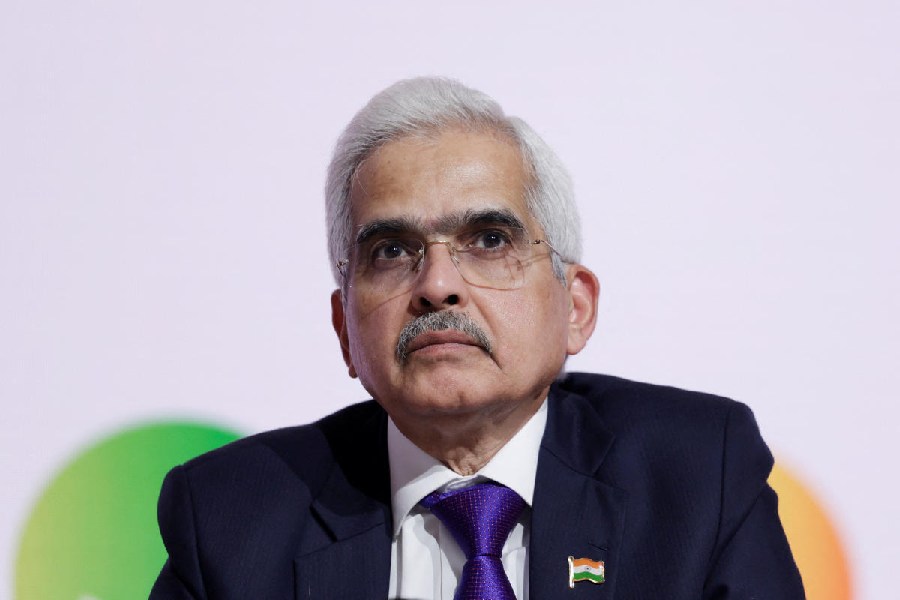Reserve Bank Governor Shaktikanta Das on Thursday said the Indian growth story remains intact with consumption and investment demand growing in tandem, and emphasised that past reforms need to be augmented by reforms in land, labour and agricultural markets.
The governor also asked financial institutions to create tailored products to suit businesses promoted by women and MSMEs without diluting underwriting standards.
In his inaugural speech at the annual FIBAC 2024 Conference organised jointly by FICCI and IBA, Das spoke on issues relating to strengthening the financial sector and expectations from them.
The governor said that the Indian economy is forging ahead with macroeconomic and financial stability, and a favourable growth-inflation balance.
He said the Indian economy is now at a critical juncture and massive changes are taking shape in various sectors and markets.
He said the country is geared for orbital shifts and the nation's journey towards becoming an advanced economy is drawing strength from a unique blend of factors -- a young and dynamic population, a resilient and diverse economy, a robust democracy, and a rich tradition of entrepreneurship and innovation.
The National Statistical Office (NSO) has placed India's GDP growth at 6.7 per cent in the first quarter of 2024-25.
"Notwithstanding the moderation in growth from the previous quarter and below our projection for Q1, the data shows that the fundamental growth drivers are gaining momentum. This gives us confidence to say that the Indian growth story remains intact," Das said.
He said private consumption, which is the mainstay of aggregate demand with a share of around 56 per cent in GDP, has rebounded to 7.4 per cent growth from a feeble 4 per cent growth in the second half of the previous year, reconfirming the revival of rural demand.
"The headline number (Q1 GDP), however, came lower against the backdrop of muted government expenditure of both the centre and the states, perhaps due to the Lok Sabha elections. Excluding government consumption expenditure, GDP growth works out to 7.4 per cent," he said.
Stressing that the government expenditure of the centre and the state governments is likely to pick up pace in line with the budget estimates in the remaining quarters of the year, Das said "the Reserve Bank's projection of GDP growth at 7.2 per cent for 2024-25 does not appear out of place".
He further said the Indian economy would need a multi-pronged and a multi-sectoral approach and the focus should be on employing all engines of growth from both supply and demand sides.
"A holistic approach to nurture and accelerate a broad-based growth of the economy would also necessitate preservation of the gains of past reforms and accelerating India's reform journey with more reforms," he said.
Emphasising that reforms like GST, IBC, and flexible inflation targeting framework have yielded long-term positive outcomes, the governor said "these reforms need to be augmented by reforms in land, labour and agricultural markets".
On the price front, he said the pace of disinflation is frequently interrupted by volatile and elevated food inflation.
"It is the headline inflation that matters," he said.
With the monsoon progressing well and the healthy Kharif sowing raising prospects of better harvest, there is greater optimism that food inflation outlook could become more favourable over the course of the year, he said.
"We have to remain watchful of how the forces impacting inflation play out. The balance between inflation and growth is well-poised. We must successfully navigate the last mile of disinflation, and preserve the credibility of the flexible inflation targeting (FIT) framework which is a major structural reform," the governor added.
Das further said while traditional metrics of economic growth like GDP and per capita GDP are important indicators of progress, they alone do not capture the full picture of what it means for a nation to be truly developed.
"India has made remarkable progress in extricating people out of poverty. A truly developed India must ensure that every citizen, regardless of their socio-economic status, has access to financial services and has the required financial literacy," he said.
Highlighting that India's female labour force participation remains lower than the global average, he said this gap underscores the urgent need for targeted initiatives such as improving girls’ education, skill development, workplace safety, and addressing societal barriers.
He noted that women entrepreneurs often face significant challenges including limited access to capital, restrictive societal norms, and difficulties in accessing affordable finance.
"The financial sector has a crucial role to play in bridging this gender gap by implementing supportive policies, creating tailored financial products, and leveraging fintech innovations to offer better access to finance," he stressed.
On micro, small and medium enterprises, he said the financial sector may play an active role in supporting MSMEs.
Banks and financial institutions may develop tailored financial products and services that cater specifically to the needs of MSMEs, he said.
"This includes offering flexible credit options, improving access to working capital, and providing financial support that accommodates the unique cash flow cycles and growth stages of MSMEs," he said.
This can propel MSMEs to expand, enhance their productivity, and contribute more significantly to job creation, the governor said.
Except for the headline, this story has not been edited by The Telegraph Online staff and has been published from a syndicated feed.











